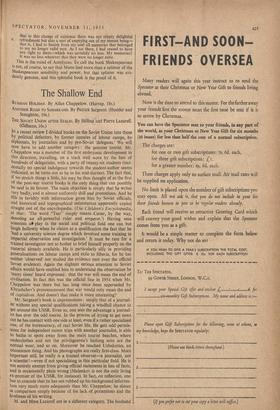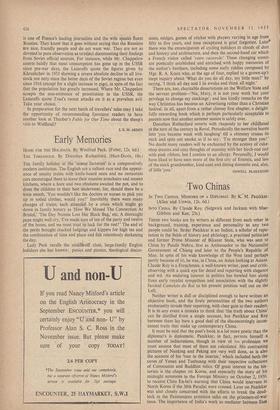The Shallow End
RUSSIAN HOLIDAY. By Allan Chappelow. (Harrap, 18s.) THE SOVIET UNION AFTER STALIN. By Helene and Pierre Lazareff. (Odhams, 16s.) IN A recent review I divided books on the Soviet Union into those by political defectors, by former inmates of labour camps, by diplomats, by journalists and by pro-Soviet 'delegates.' We will now have to add another category : the genuine tourist. Mr. C:happelow was a member of the first embryonic development in this direction, travelling, on a track well worn by the feet of hundreds of delegations, with a party of twenty-six students (inci- dentally no special indulgence towards the student-author seems indicated, as he turns out to be in his mid-thirties). The fact that, if we stretch things a little, his may be thus thought of as the first of the post-war tourist books is the only thing that can possibly he said in its favour. The main objection is simply that he writes very badly, and is almost uniformly dull and pretentious. And he tills in lavishly with information given him by Soviet officials, and historical and topographical information apparently copied straight out of the encyclopedia. (The Children's Encyclopcediu, at that: 'The word "Tsar" simply means Ctesar, by the way, denoting an all-powerful ruler and emperor.') Having seen scientists a* play in the social and political field one can but laugh hollowly when he claims as a qualification the fact that he `had a university science degree which involved some training in impartial observation and investigation.' It must be rare for a trained investigator not to bother to brief himself •properly on the material already available. He is particularly silly in providing generalisations on labour camps and exile to Siberia, for he has neither 'observed' nor studied the evidence (not even the official Soviet evidence). Again the slightest serious attention to Soviet affairs would have enabled him to understand the observation he `many times' heard expressed : that the war will mean the end of civilisation. In fact this was the official line in 1954 when Mr. Chappelow was there but has long since been superseded by khrushchev's pronouncement that war would only mean the end of capitalism. And doesn't that make it more interesting?
Mr. Sergeant's book is unpretentious : simply that of a journal- ist without any special qualifications taking a windfall chance to get around the USSR. Even so, one sees the advantage a journal- ist has over the odd tourist. In the process of trying to get news out he has contact with one side at least, even if a rather specialised one, of the bureaucracy, of real Soviet life. He gets odd permis- sions for independent motor trips with another journalist, is able to bathe at spots away from the main tourist beaches, where underclothes and not the priviligentsia's bathing suits are the normal wear, and so on, Moreover he reached Uzbekistan, an uncommon thing. And his photographs are really first-class. More important still, he really is a trained observer-a journalist, not a scientist!—even if not specialising in this particular field. He is not entirely exempt from giving official statements in lieu of facts, and is occasionally plain wrong (Malenkov is not the only living ex-premier of the USSR, for instance). In fact, on reflection, one has to concede that he has not rubbed up his background informa- tion very much more adequately than Mr. Chappelow; he shines in comparison simply because of his lack of pretentious and the liveliness of his writing.
M. and Mme Lazareff are in a different category. The husband
is one of France's leading journalists and the wife speaks fluent Russian. They know that it goes without saying that the Russians are nice, friendly people and do not want war. They are not so devoted to pure observation as to reject documenting their findings from Soviet official sources. For instance, while Mr. Chappelow asserts baldly that meat consumption has gone up in the USSR since pre-war days, the Lazareffs quote the figures given by Khrushchev in 1953 showing a severe absolute decline in all live- stock not only since the better days of the Soviet regime but even since 1916 (except for a slight increase in pigs), in spite of the fact that the population has greatly increased. Where Mr. Chappelow accepts the non-existence of prostitution in the USSR, the Lazareffs quote Trud's recent attacks on it as a prevalent evil. Take your choice.
In preparation for the next batch of travellers' tales may I take the opportunity of recommending Spectator readers to have another look at Thurber's Fable for Our Time about the sheep's visit to Wolfiand?
3. E. M. ARDEN



































 Previous page
Previous page